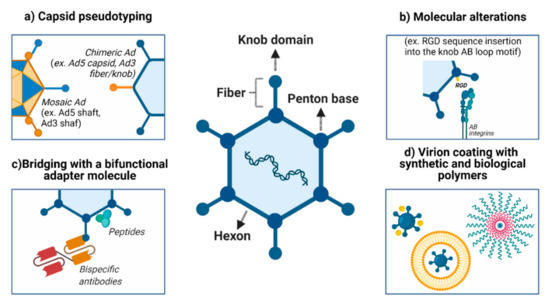Cancers, Vol. 13, Pages 1863: Nonreplicating Adenoviral Vectors: Improving Tropism and Delivery of Cancer Gene Therapy
Cancers doi: 10.3390/cancers13081863
Authors: Nayara Gusmão Tessarollo Ana Carolina M. Domingues Fernanda Antunes Jean Carlos dos Santos da Luz Otavio Augusto Rodrigues Otto Luiz Dutra Cerqueira Bryan E. Strauss
Recent preclinical and clinical studies have used viral vectors in gene therapy research, especially nonreplicating adenovirus encoding strategic therapeutic genes for cancer treatment. Adenoviruses were the first DNA viruses to go into therapeutic development, mainly due to well-known biological features: stability in vivo, ease of manufacture, and efficient gene delivery to dividing and nondividing cells. However, there are some limitations for gene therapy using adenoviral vectors, such as nonspecific transduction of normal cells and liver sequestration and neutralization by antibodies, especially when administered systemically. On the other hand, adenoviral vectors are amenable to strategies for the modification of their biological structures, including genetic manipulation of viral proteins, pseudotyping, and conjugation with polymers or biological membranes. Such modifications provide greater specificity to the target cell and better safety in systemic administration; thus, a reduction of antiviral host responses would favor the use of adenoviral vectors in cancer immunotherapy. In this review, we describe the structural and molecular features of nonreplicating adenoviral vectors, the current limitations to their use, and strategies to modify adenoviral tropism, highlighting the approaches that may allow for the systemic administration of gene therapy.



No comments:
Post a Comment